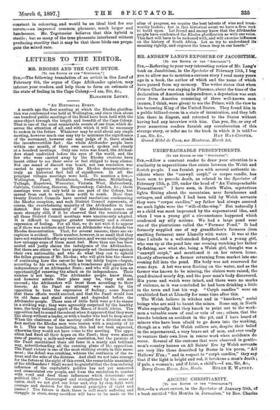LETTERS TO THE EDITOR.
MR. RHODES AND THE CAPE DUTCH.
[TO THE EDITOR 07 THE " SPECTATOR."] Sin,—The following translation of an article in Ons Land of February 6th, the organ of Cape Afrikander opinion, may interest your readers, and help them to form an estimate of the state of feeling in the Cape Colony.—I am, Sir, &c.,
ELISABETH LECKY, " AN HISTORICAL EVENT.
A month ago the first meeting at which the Rhodes glorifica- tion was condemned was held at Wellington, and since then about one hundred public meetings of the Bond have been held with the same object through the length and breadth of the Cape Colony. That is one of the most remarkable events of our time, which de- serves the attention of all, and with which it will be necessary to reckon in the future. Whatever may be said about any single meeting, however much one may try to minimise the significance of the movement, however one may judge of it, there stands the incontrovertible fact : the whole Afrikander people have within one month, of their own accord, spoken out clearly at a hundred meetings. Only one voice was heard, the Afrikan- ders stand undivided before the eyes of the world, and the few who were carried away by the Rhodes ovations have learnt either to see their error or feel obliged to keep silence. Not one sound of discord was heard, not one resolution was carried to approve or justify the Rhodes demonstration— truly an historical fact full of significance. In all the principal villages meetings were held. To mention a few,— Wellington, Paarl, Stellenbosch, Swellendam, Middelburg, Tulbagh, Hopetown, Worcester, Victoria West, Malmesbury, Calvinia, Colesberg, Hanover, Burgersdorp, Caledon, &c. ; these meetings were not only held in one part of the Colony, but spread from east to west, from north to south. More than twenty District Councils have carried resolutions condemning the Rhodes reception, and each District Council represents, of course, the overwhelming majority of the Afrikanders in that district. But the unanimity of the Afrikanders comes out more strongly still, if it be observed that the resolutions of all those District Council meetings were unanimously adopted. It is difficult to imagine greater unanimity and a clearer expression of feeling. For all that, we do not wish it to appear as if there was notthere and there an Afrikander who defends the Rhodes demonstration. That, for several reasons, there are ex- ceptions is evident. Their number, however, is so small that they have not ventured to offer any resistance, and we can easily imagine how unhappy some of them must feel. More than one has been misled and justly claims the indulgence of the Afrikanders. But there are others who have purposely set themselves against their own nationality, and who do what they can to uphold the fallen greatness of Mr. Rhodes ; who will give him the chance of continuing here the career he has but lately begun—begun, according to his own words, with a treacherous plot against the independence of an Afrikander State ; and who will give him an opportunityof renewing the attack on its independence. Their number is not large. The Afrikander people know them, and however astute their plans may be, they will not succeed ; the Afrikanders will treat them according to their deserts. At the Paarl an attempt was made by the opposition to turn the expression of feeling ; some feared that these efforts would succeed, and that the Pearl would lose its old fame and stand stained and degraded before the Afrikander people. Those men of little faith were prt to shame in a striking way ; they were agreeably surprised by the healthy tone, the truly national spirit of the Mecca of South Africa. The opposition had to sound the retreat when it appeared that they were like sheep without a leader, or with a leader who had to keep aloof. When the chairman of the meeting called for a division on the first motion the Rhodes men were beaten with a majority of 10 to 1. This was too humiliating, this had not been expected, otherwise they would not have come to the meeting. The oppo- sition had fixed all their hopes on the Pearl; they were almost sure of passing a milk-and-water resolution, but the patriots of the Pearl maintained their old fame in a manly and brilliant way, notwithstanding all the cunning plans of the opposition. The Paarl victory is one of the most striking events in this move- ment ; the defeat was crushing, witness the confusion of the re- treat and the echo of the distress. And shall we not take courage for the future at the sight of this event, the remarkable unanimity of the Afrikanders ? Shall we not be grateful that the demoralising influence of the capitalist's politics has not yet unnerved and emasculated our people, and form the resolution to combat with word and deed those influences which deteriorate our political life ? Encouraged and strengthened by the sense of union, shall we not gird our loins and, step by step, fight with courage and decision for the eternal principles of right and justice ? The future is dark, there is still much suffering and straggle in store, many sacrifices will have to be made on the altar of progress, we require the best talents of wise and trust- worthy leaders ; but in this historical event we have a firm rock to build upon. Let friend and enemy know that the Afrikander people have condemned the Rhodes glorification as with one voice. This fact will have to be reckoned with, and will exercise influents* on the history of South Africa. Let us try to understand its meaning rightly, and engrave the lesson deep in our hearts."






































 Previous page
Previous page